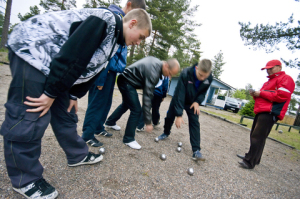In the classic book Anna Karenina, Tolstoy declared, “All happy families are alike; each unhappy family is unhappy in its own way.”
In my work as a therapist, I learned this is not true. Behavioral patterns in families tend to repeat over and over, no matter whose family it is. The details may change, but the overarching story is often the same.
The Jones family argues over who makes the cranberry sauce while the McKenzie family fights over who got the best gift. But it is not really about the eggnog and the gifts – it’s about something deeper. Who is the favored one? Who has power in the family?
[Tweet “Families – happy and unhappy – share a lot of the same dynamics.”]
And within each clan, those dynamics run deep. You’re a competitive, competent grown-up who reverts to feeling like a five-year-old in 30 minutes flat when you visit your parents. The holidays tend to exacerbate this phenomenon.
Cram a lot of relatives together with high expectations of joy and cuddliness, and you’ll see people affected by old memories, old hurts, and old grudges.
It might play out in a predictable way, like this:
When Aunt Martha complains that Susan’s pecan pie is too watery, Uncle Dave automatically disagrees with her. Then Aunt Martha throws back another shot of whiskey. Right on cue, your mom tries to divert attention by talking about great-nephew Owen’s football season, but Great-Grandpa finds a way to tie it all back to Obamacare.
The intricacy of this choreography is almost like a Broadway musical.
What’s your part in this dance?
Even if you’ve never thought about it this way, you have been practicing your part for a long, long time. When faced with old, familiar conflicts, do you use old ways of coping like yelling, sulking, drinking, or overeating?
How might you change your part of the choreography?
It might not seem like it is possible to change anything. And it’s true, you cannot change other people. But when you change your own behaviors, it changes the environment. This allows a little space for others to change their ways, too.
They might not change right away. They might even push back harder at first. This is normal. If you change from the cha-cha to the tango, others might be surprised. They’ll try to convince you to come back to the cha-cha.
Families adjust all the time, like when someone gets married or a child goes off to college. Even rigid families make some changes over time.
Even if your family seems like they’ll never change, here are some tips to help with holiday family stress.
Keep your expectations reasonable.
In this EOP (Era of Pinterest), it is easy to get caught up in images of perfection. The perfect holiday meal, decorations, parties, family photos. Ironically, all the stress this causes makes your mood anything but perfect.
No matter how much you chase it, perfection is an illusion. Your (im)perfect self is exhausted.
Going easier on yourself can help you enjoy the season more. No one will miss that one extra type of Christmas cookie. Or the extra-special bow on the gift.
This goes for your family, too. Recognize that your family will be no more perfect over the holidays than at any other time. Going more with the flow can boost your appreciation of your relatives on their own terms.
Keep the big picture in mind.
Rather than getting caught up in the details about when gifts are exchanged, or who said what about whom, look at the big picture. Try to get at the meaning of an action instead of just how it is carried out. Too often, we get caught up in the details and miss the larger meaning of events.
For example, do you need to make Grandma’s fruitcake when no one will even eat it? Or is there something else you can do as a family to remember and honor her?
Take care of yourself.
Repeat after me: “I can say no.”
Say it again.
Protecting energy and personal boundaries is often difficult for women. You may see it as being selfish. But just because someone asks you to do something doesn’t mean you have to agree to it. They are welcome to ask. And you are welcome to say yes or no.
You can refuse a party invitation, or go for a short time.
You can send store-bought treats to your child’s school instead of making something from scratch. (I heard you gasp, but everyone will live through it.)
People often think in terms of a catastrophe –the worst that could possibly happen. But typically, outcomes are a lot less serious than you anticipate. You are not a terrible person for not catering to your sister-in-law’s demands. Even if relatives try to tell you so.
Which brings up the last tip:
Be civil.
Sometimes, other people are cranky. They may be downright unpleasant. This doesn’t mean you have to match their mood or tactics.
One way to communicate clearly while minimizing others’ defensiveness is to use I statements. Telling your cousin “you are the biggest excuse of a rat I have ever met” is unlikely to help either of you be your best selves. Instead, say, “I feel really uncomfortable when you talk about me throwing up on my 7th grade crush. I wish you would tell some other stories.”
This is not a guarantee that your cousin will become more respectable. However, it offers an invitation for him to make changes without becoming defensive. And if he continues to tell the same story, at least you clarified your wishes without getting engaged in an argument.
What are some of the things you experience with your relatives during the holidays?









